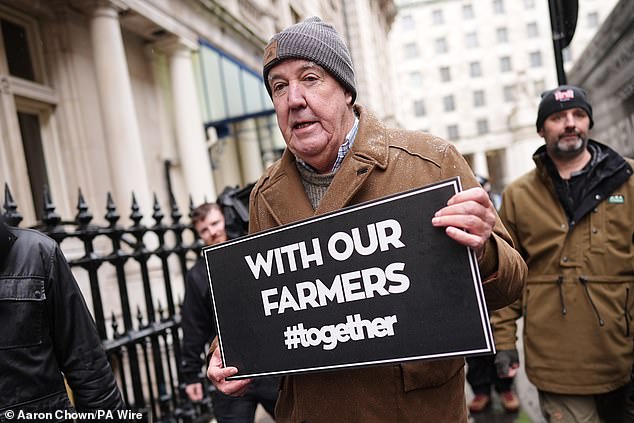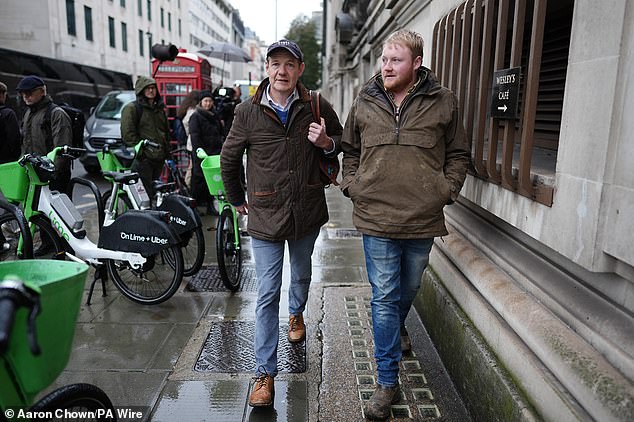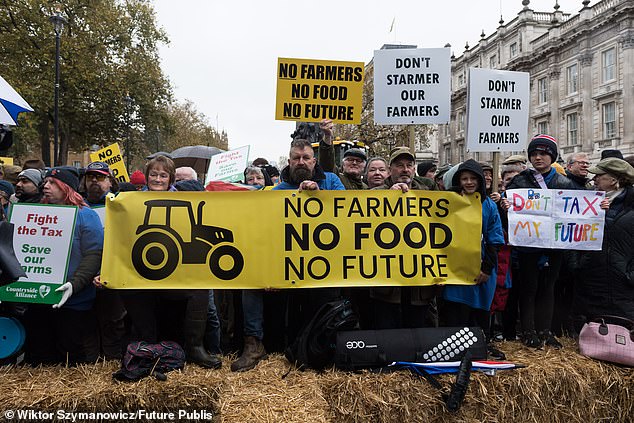Farmers are the collateral damage of the latest round of terrible British tax policy.
The Budget raid on inheritance tax on family farms was an ill-thought-out solution to a problem created by a bad tax, which no Chancellor has been brave enough to reform properly or simply get rid of.
Agricultural property relief was in place to prevent family farms from having to be broken up and sold to pay inheritance tax as they were passed down from generation to generation.
However, for many years it has been an open secret that the very rich have been buying farmland to avoid inheritance tax. It is known as the easiest way to transfer £20 million tax-free.
Rachel Reeves announced she wanted to put an end to this in the Budget, putting a £1m tax-free limit on agricultural properties and charging a 20 per cent inheritance tax above that limit.
But this was one of the worst possible solutions, as the very rich still get an exemption from inheritance tax on land (a 50 per cent discount on the standard IHT rate), while real farmers face the potential consequences for their livelihoods of large IHT bills.
It landed on this: Farmers took to the streets of London this week to protest against the Budget measure to impose an inheritance tax on family farms.
The budget announcement made no attempt to distinguish between investors and actual farmers, so it is not surprising that it backfired and sparked protests.
Investors can sell their land at any time and move on, farmers are small business owners for whom land is an essential resource.
You can see why farmers ask: ‘Why are they attacking us?’
The inheritance tax exemption has continued unchecked for years and has driven up the price of farmland, with wealthy investors often pushing farmers out of the way.
Now farmers have become victims of a crackdown on the very rich who take advantage of a tax break designed to protect them.
And this comes at the same time that the government’s bungling of a supposedly improved post-Brexit payments system has left its income even more precarious.
The British countryside faces big challenges, including climate change, food security and the need to reverse the depletion of nature that has occurred since the rise of industrial agriculture after the Second World War.
Farmers are the stewards of our land, the providers of our food and the caretakers of nature. They are on the front line in improving the environment and caring for the landscape that many Britons value so much.
The government needs to work with farmers to improve things, but somehow, in less than six months, it has managed to alienate them.
I suppose someone at the Treasury looked at Clarkson’s Farm before carrying out this inheritance tax raid and realized that, while they may look rich on paper, British farmers are not doing it.
The Amazon series follows Jeremy Clarkson as he makes the switch from petrolhead to tractorhead and, while the TV presenter isn’t everyone’s cup of tea, he has won praise for highlighting the struggles of British farmers.
Clarkson shows how difficult it is to make money from a farm, even if you have all the advantages of fame and fortune, and he repeatedly and readily admits that he couldn’t continue farming if he didn’t make a mint somewhere else. .
Even if the only investigation Labor did was tell an adviser to sit down and watch a few episodes of Clarkson’s Farm and then report back, it should have been enough to stop this raid until they could think through the policy better.

Farm and fortune: Jeremy Clarkson has won acclaim for his television series Clarkson’s Farm and has highlighted the plight of British farmers.
I don’t claim to have any experience in agriculture, but as a financial journalist I know a little about the inheritance tax issue and have observed the issue through families who farm, have farmed, or live in agricultural areas.
In the latter case, my relative in the border country of Shropshire has long told me about the problem of wealthy investors buying up as much land as possible, driving existing farmers out of sales, preventing young farmers from starting their own farms and preventing tenant farmers from purchasing the land they farm.
I also have two relatives on different sides of my family who farm or have farmed in the Southeast. In this part of the country, the low profits made in agriculture contrast even more with how expensive land is.
The problem here is not only the evasion of inheritance tax, but also the option of fields for housing. If you can get green belt land allocated for housing, you can reap lottery-winning sums with a simple stroke of a planner’s pen.
I cite these examples not to claim any authority, but to illustrate how it doesn’t take very deep knowledge to realize that the change in the budget was too simplistic and that it would be farmers who would bear the brunt, not wealthy investors. which they supposedly were. targeting.
Labor used a sledgehammer to crack a nut: these changes are only forecast to raise around £550m and that’s probably optimistic.
Meanwhile, their figures on how few farmers will be affected seem suspect and don’t pass the smell test. It claims these figures verified by the OBR show that 72 per cent of farms will not pay inheritance tax under the new rules.
The National Farmers Union says this is not the case and that Defra’s own figures indicate that 66 per cent of farms would be affected.
Estate agents agree the extent is larger than the Treasury says and there are suggestions that its figures have been skewed by the inclusion of ordinary properties owning just a few acres claiming agricultural property relief against IHT.
The situation has escalated into a defamation dispute and farmers flocked to London to protest this week and threaten strikes.

What is very clear is that there was almost certainly a better option.
For starters, the inheritance tax needs a complete overhaul, or perhaps simply its elimination; There is an IHT report from the Office of Tax Simplification from six years ago that is collecting dust that describes it in detail.
No chancellor has been brave enough to properly sort out the inheritance tax, so they keep making things worse while profiting.
In the latter case, farmers lose their protection and the rich still get a tax cut.
There aren’t that many inheritance tax claims for farming help each year and only about 500 above £1m are likely to have already been examined, and it wouldn’t have been difficult to determine whether someone is actually a farmer.
We could have maintained protection for family farms and substantially reduced the tax break for large land investors, while still giving them some reward if they were good stewards of the land.
Or we could have had an even bolder idea.
We continue to allow this tax exemption, but since the rest of us taxpayers foot the bill, there is a trade-off: if you are a large landowner and want your land free of inheritance tax, you must allow us access. with a Scottish-style right to wander about it.
Some links in this article may be affiliate links. If you click on them, we may earn a small commission. That helps us fund This Is Money and keep it free to use. We do not write articles to promote products. We do not allow any commercial relationship to affect our editorial independence.

